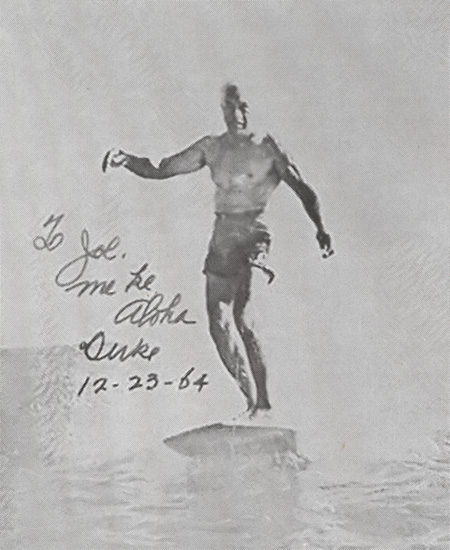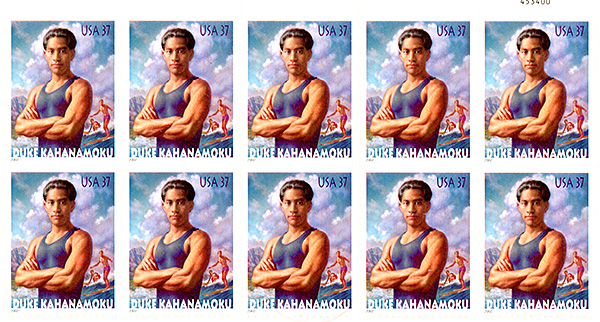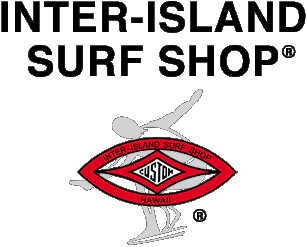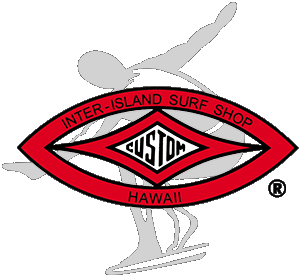Duke
Paoa Kahinu Mokoe Hulikohola
Kahanamoku Tribute
August 24, 1880 - January 22,1968

Special Memento of Joe Kuala (aka: Joe Kitchens)
Duke Paoa Kahinu Mokoe Hulikohola Kahanamoku (August 24, 1890 — January 22, 1968) was an American competition swimmer who was also known as an actor, lawman, early beach volleyball player and businessman credited with spreading the sport of surfing. Kahanamoku was a five-time Olympic medalist in swimming.
The name "Duke" was not a title or a nickname, but a given name. He was named after his father, Duke Halapu Kahanamoku, who was christened Duke by Bernice Pauahi Bishop in honor of Prince Alfred, Duke of Edinburgh, who was visiting Hawaii at the time of the elder man's birth in 1869. The younger Duke, as eldest son, inherited the name. His father was a policeman. His mother Julia Pa'akonia Lonokahikina Paoa was a deeply religious woman with a strong sense of family ancestry.
Growing up on the outskirts of Waikiki, Kahanamoku spent his youth as a bronzed beach boy. It was at Waikiki Beach where he developed his surfing and swimming skills. In his youth, Kahanamoku preferred a traditional surf board, which he called his "papa nui", constructed after the fashion of ancient Hawaiian "olo" boards. Made from the wood of a koa tree, it was 16 feet (4.8 m) long and weighed 114 pounds (52 kg). The board was without a skeg, which had yet to be invented. In his later career, he would often use smaller boards, but always preferred those made of wood.
On August 11, 1911, in an amateur swim meet, Kahanamoku was timed at 55.4 seconds in the 100 yard (91 m) freestyle, beating the existing world record by 4.6 seconds, in the salt water of Honolulu Harbor. He also broke the record in the 220 yd (201 m) and equaled it in the 50 yd (46 m), but the Amateur Athletic Union (AAU), in disbelief, would not recognize these feats until many years later. The AAU initially claimed that the judges must have been using alarm clocks rather than stopwatches, and later claimed that ocean currents aided Kahanamoku.
Kahanamoku easily qualified for the U.S. Olympic swimming team in 1912, breaking the record for the 200 meter freestyle in his trial heat for the 4x200 relay. He went on to win a gold medal in the 100 meter freestyle in the 1912 Olympics in Stockholm, and a silver with the relay team. During the 1920 Olympics in Antwerp, he won gold medals both in the 100 meters (bettering fellow Hawaiian Pua Kealoha) and in the relay. He finished the 100 meters with a silver medal during the 1924 Olympics in Paris, with the gold going to Johnny Weissmuller and the bronze to Duke's brother, Samuel Kahanamoku. He also played for the U.S. water polo team at the 1932 Summer Olympics.
Between Olympic competitions, and after retiring from the Olympics, Kahanamoku traveled internationally to give swimming exhibitions. It was during this period that he popularized the sport of surfing, previously known only in Hawaii, by incorporating surfing exhibitions into these visits as well. His surfing exhibition at Sydney's Freshwater Beach on December 23, 1914 is widely regarded as a seminal event in the development of surfing in Australia.[7] The board that Kahanamoku built from a piece of pine from a local hardware store is retained by the Freshwater Surf Club. There is a statue of Kahanamoku on the headland at Freshwater. He made surfing popular in mainland America first in 1912 while in Southern California.
While living in Newport Beach, California on June 14, 1925, Kahanamoku rescued eight men from a fishing vessel that capsized in heavy surf while attempting to enter the city's harbor. 29 fishermen went into the water and 17 perished. Using his surfboard, he was able to make quick trips back and forth to shore to increase the number of sailors rescued. Two other surfers saved four more fishermen. Newport's police chief at the time called Duke's efforts "the most superhuman surfboard rescue act the world has ever seen."
Kahanamoku died of a heart attack on January 22, 1968 at the age of 77. A monument at Waikiki beach in Honolulu honors his memory. It shows Kahanamoku standing in front of his surfboard with his arms outstretched. Many honor him by placing leis on his statue.
Duke Paoa Kahinu Mokoe Hulikohola Kahanamoku - "This is Your Life"



